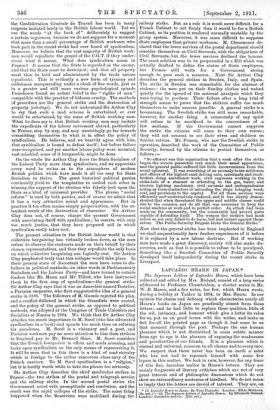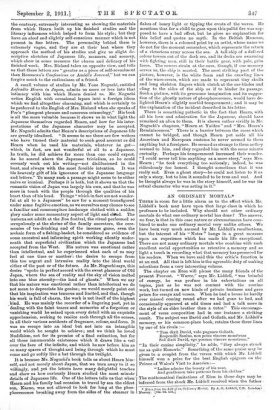LAFCADIO HEARN IN JAPAN.*
The Japanese Letters of Lafcadio Hearn, which have been collected.and edited by Mrs. Bisland, consist of a long series addressed to Professor Chamberlain, a shorter series to Mr. W. B. Mason, and a few notes, too few, which Hearn wrote, during a holiday at Yaidzu in 1894, to Mrs. Hearn. In our opinion the charm and delicacy which characterize nearly all Hearn's books 071 Sapan are practically absent from these letters ; and he had little to replace these qualities, little of the wit, intimacy, and humour which give a letter its value for us, put us on good terms with the writer, and make us feel for all the printed page as though it had come to us that moment through the post. Perhaps the one human pleasure which is not diminished in some subtle manner from age to age is the pleasure of exposing the weaknesses and peculiarities of our friends. It is a pleasure which is ,eternal eternal and universal, common to all classes and to every race. We suspect that there never has been on earth a saint who has not had to reproach himself with some few :lapses in this matter. We look in vain; however, for any trace of this fine, harmless malice in Hearn's letters. They are mainly fraiments of literary criticism which are nbt of very 'great interest and of philosophic discussions which do not show an extraordinary acuteness of intellect. We do not mean to imply that the letters are devoid of interest. They are, on
• (1) Lafcadio /learn in Japan. By Tone Nognebi. London : Elkin Matheare. net.]—(2) The Japanese Lettere of Lafcadio Hearn. By Elizabeth Bisland. London: Constable and Co. Ms. net. J
the contrary, extremely interesting as showing the materials from which Hearn built up his finished studies and the literary influences which helped to form his style ; but they have an aloof and slightly self-conscious manner which is not present in fine letters. The personality behind them is extremely vague, and they are at their best where they approach the method of his studies and give us slight de- scriptive sketches of Japanese life, manners, and scenery, which show in some measure the charm and delicacy of his finished work. Mrs. Bisland takes an opposite view, and tells us that these letters are "greater as a piece of self-revealment than Rousseau's Confessions or Amiel's Journal," but we can forgive much to the enthusiasm of a friend.
A small volume of studies by Mr. Tone Noguchi, entitled Lafcadio Hearn in Japan, admits us more or less into that intimacy with him which Hearn denied sig. Mr. Noguchi writes English with occasional lapses into a foreign idiom which we find altogether charming, and which is certainly to be preferred to the English of Mrs. Bisland when she speaks of Poe's " plangent phrases and eanorous orismology." His book is all the more valuable because it shows us in what light the Japanese themselves regarded Hearn, and how far his inter- pretations of the Japanese character may be accepted. Mr. Noguchi admits that Hearn's descriptions of Japanese life are greatly idealized. "It seems to me there are few writers who have turned their material to such good account as did Hearn when he used his materials, whatever he got— which, in fact, are not wonderful at all to a Japanese. In truth, he did achieve far more than one could expect. As he soared above the Japanese trivialism, so he could serenely work out his writing—not disillusioned in the least, and always with the most forcible intention. It was his heavenly gift of his ignorance of the Japanese language and letters." To many such a passage might seem to be either naive or ironical. Perhaps it is both, but it shows us that the romantic vision of Japan was largely his own, and that he was more in touch with the people through the qualities of his heart than of his head. Things " which in fact are not wonder- ful at all to a Japanese" he saw for a moment transfigured under some fugitive emotion, as we ourselves may chance to see a familiar and commonplace landscape clothed with a sudden glory under some momentary aspect of light and dead. The lanterns set adrift at the Bon festival, the ritual performed so scrupulously at the shrine of the family ancestors, the cere- monies of tea-drinking and of the incense game, even the archaic form of a fishing-basket, he considered as evidence of some ancestral and informing spirit working silently under- neath that superficial civilization which the Japanese had accepted from the West. His nature was emotional rather than intellectual, and he experienced what each of us may feel at one time or another : the desire to escape from this too urgent and intrusive reality into the ideal world either of the past or of the future. As Mr. Noguchi says, this desire "spoke in perfect accord with the sweet glamour of Old Japan, where the sea of reality and the sky of vision melted into one blue eternity—the land of ghosts." When we say that his nature was emotional rather than intellectual we do not mean to depreciate his genius ; we would merely point out that his inspiration was tenuous and limited, and that, though his work is full of charm, the work is not itself of the highest kind. He was mainly the recorder of a lingering past, yet in dealing with the faint traces and memories of a forgotten or vanishing world he seized upon every detail with an exquisite apprehension, seeking to realize each through all the senses, in all their various accidents of fragrance, colour, and form. It was an escape into an ideal but not into an intangible world which he sought to achieve ; and we think he loved Buddhism, not for its promise of a final extinction, but for all those innumerable existences which it draws like a veil over the face of the infinite, and which he saw before him as BO many spaces of thought and being through which he must come and go softly like a bat through the twilight.
It is because Mr. Noguchi's book tells us about Hearn him- self, and not merely about Japan, that we turn away to it so willingly, and yet the letters have many delightful touches and show us how curiously Hearn studied the most minute details of Japanese life. One of the letters tells us that when Hearn and his family had occasion to travel by sea the eldest son, Kazuo, was not allowed to look for long at the phos- phorescence breaking away from the sides of the steamer in
flakes of hoary light or tipping the crests of the waves. He mentions that for a child to gaze upon this pallid fire was sup- posed to have a bad effect, but he gives no explanation for this belief and quotes no myth. In the British Museum, however, there is a coloured print by an artist, whose name we do not for the moment remember, which represents the return of a victorious army across the sea. A tall ship of a dull-red colour towers out of the dark sea, and its decks are swarming with fighting men, still in their battle gear, with pale, grim faces. The rowers strain at the oars, though, if our memory serves us, the ship is masted. The most striking part of the picture, however, is the white foam and the crawling lines of the wave-crests, which are made to represent tiny skulls and long skeleton fingers which clutch at the oar-blades and cling to the sides of the ship as if to hinder its passage. Such a picture, with its gruesome imagination and its sugges- tion of the ghostly nature of phosphorescence, would have de- lighted Hearn's slightly morbid temperament ; and it may be the explanation of the incident described in his letter.
There is something pathetic in the fact that Hearn, with all his love and admiration for the Japanese, should have remained an alien to them. It is shown rather vividly in Mr. Noguchi's chapters, "Hearn at Yaidzu " and "Mrs. Hearn's Reminiscences." There is a barrier between the races which cannot be bridged, and though Hearn put aside all his American and European customs he never seemed to them anything but a foreigner. He seemed as strange to them as they seemed to him, and they regarded him with the same minute curiosity. Perhaps his temperament increased their wonder. "I could never tell him anything as a mere story," says Mrs. Hearn ; "he took everything too seriously; indeed, he was ridiculously to honest. I thought sometimes that it was really sad. Even a ghost story—he could not listen to it as only a story, but to him it sounded to be true and real. And he thought always he was in the story himself, and he was its actual character who was acting in it."







































 Previous page
Previous page